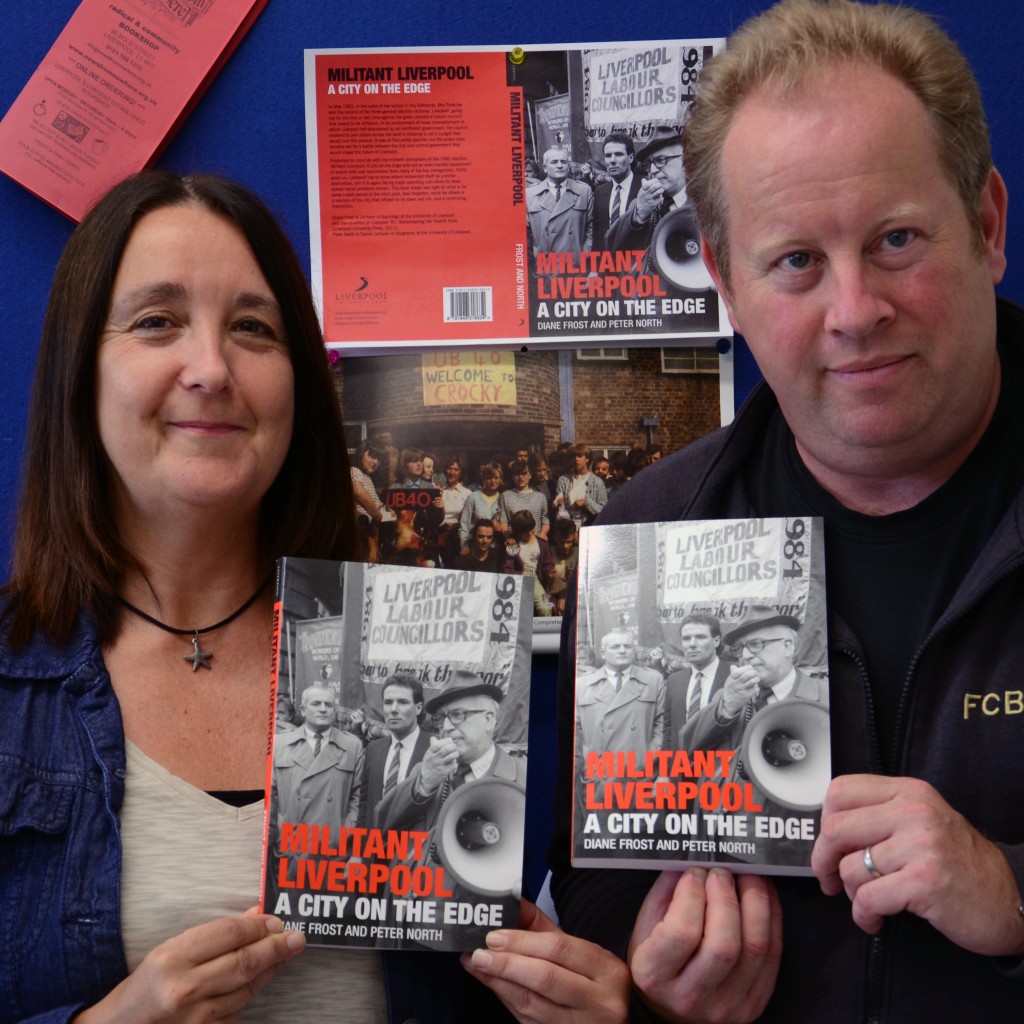Dr Diane Frost and Dr Peter North with copies of their new book, Militant Liverpool: A City of the Edge
Dr Diane Frost, Department of Sociology, Social Policy and Criminology and Dr Peter North, Department of Geography and Planning
“This month marks the 30th anniversary of the election of the Liverpool Labour Council and the recently published Militant Liverpool: A City on the Edge (2013 LUP) revisits those years with fresh eyes and a reflective perspective.
“In May 1983, the Conservatives under Margaret Thatcher had just won a second term in office, whilst in Liverpool a left-wing Labour council was elected with a majority. You could say the scene was set for an inevitable confrontation between these two ideologically opposed camps, as Liverpool joined existing and future left-led Labour councils in places like London, Sheffield and Manchester. Those years have become an important part of Liverpool’s history.
Opposed views
“What is interesting but perhaps not surprising it that the memories of those years continue to resonate in the strong and diametrically opposed views from many of those who lived through these years.
“On the one hand, the period is remembered as leaving a lasting legacy that damaged the reputation of the city, hindered future economic investment here and gave the city a ‘bad name’ with its far-left ‘municipal Stalinism’ as it was labelled.
“For others, these years represent a watershed from the years of weak political leadership under the Liberals and poor economic growth and investment. The council epitomised for this group, the resilience and guts of a Liverpool that stood up as a city to resist the cuts of the Thatcher government – something to celebrate and a proud chapter of the city’s history.
“As well as exploring the conflicts and confrontations the council grappled with at both national and local levels, the research was keen to unravel and de-construct some of the ‘truths’ from those who defend, as well as those who offer more critical voices.
“Interviews with left wing but non-Militant Labour councillors and supporters show that far from being hoodwinked by Militant, the actions of the council in those years came from a genuine commitment to resist central government cuts. This followed in the wake of closure after closure of local industries, cuts to local government spending, urban unrest and the catastrophic impact of all this on the people of Liverpool.
“Indeed, cabinet papers recently released under the thirty year rule revealed how the then Tory Government had argued that Liverpool should be subjected to what was called managed decline, in other words, be left to go to the wall.
“The ‘Toxteth riots’ of 1981 (as the national London press labelled them) underlined a number of systemic and structural problems afflicting Liverpool before Labour took control of the council in 1983. Such deep-seated issues were serious enough for Michael Heseltine (Minister of Merseyside) to argue that ‘It Took A Riot’ to get the government to recognise the problems of cities like Liverpool.
Strong sense of conviction
“Through documenting a range of views that included then councillors, it was found amongst those interviewed that a strong sense of conviction was apparent in what they were doing. Moreover, they convincingly defended the reasons for their actions and were able to reflect on what their experiences mean now the city again faces a Conservative-led government carrying out a programme of spending cuts that disproportionately hit what is still a poor city. Other accounts that were documented reflect the divides as well as the strength of communities, epitomising strong local views and feelings on issues that mattered then and now to the city and its people.
“Looking back on those troubled days, some interviewees offer a greater understanding of other positions that was perhaps not possible in the heat of the battle. Whilst clichés regarding the wonders of hindsight can easily be employed here, at the same time, sensitivities, egos and political conviction might well get in the way of honest reflections.
“On the other hand, others make no apologies for their actions and stand by their convictions that not setting a budget and implementing central government cuts was the right choice. ‘Better to break the law than break the poor’ many believed.
“Individual councillors paid the price for not setting a budget and were disbarred from office and incurred heavy fines (paid for from local and national donations from well-wishers and supporters, and from a number of trade unions). Militant members were additionally expelled from the Labour Party and were given a public dressing down seen in Labour leader Neil Kinnock’s damning speech at the 1985 Labour Party Conference.
“Looking at the evidence, the actions of the council in the years 1983-1985 suggest that this marked the time when things began to change, when the city began to regenerate after years of private sector disinvestment, punitive economic and social policies of national government, and global changes in the economy that were at the time little understood.”

